10 Best Companion Plants For Sunflowers (Plus, 3 To Avoid!)
Choose plants that will help these cheerful flowers thrive.
Whether it's a field of yellow or a bouquet of sunny blooms, a big, cheerful sunflower is one of summer's most iconic sights. Sunflowers (Helianthus annuus) are known for being easy-to-grow annuals—and sometimes perennials—that add color and height to a warm weather garden, but they thrive even more when they're planted with companion plants that encourage the sunflower to grow to its best and brightest.
Companion planting is when you put two plants side-by-side that help each other. Sometimes that means that one plant repels bugs that often attack the other plant. Sometimes it means one plant takes one for the team and attracts the bugs that often attack the other plant. Other times, it means the plants use totally different nutrients or put specific nutrients back into the ground that help each other grow. Companion plants can also encourage pollination.
For sunflowers, there are sun-loving flowers, herbs, and vegetables that make colorful and practical companion plants. We've rounded up 10 sunflower companion plants to consider as you're planning your summer garden.
Meet The Expert
Laura Janney is the Founder and Owner of The Inspired Garden.
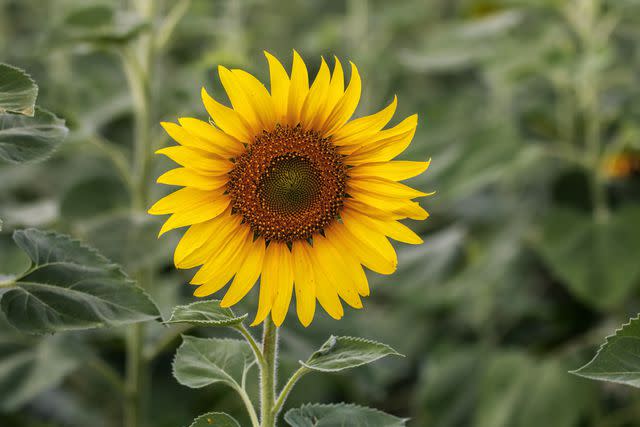
Getty Images/Rapeepong Puttakumwong
Why Should You Plant Sunflowers With Companion Plants
While sunflowers are known for being low maintenance, easy going flowers, they can benefit from growing with friends. Planting sunflowers alongside companion plants can help shield them from pests like beetles, aphids, and weevils. But even more than companion plants benefitting sunflowers, sunflowers can help other plants thrive. Their tall stature can provide shade and support to summer flowers and vegetables that can't take the hot summer sun, and their vibrant yellow flowers attract pollinators to your entire garden.
The Best Companion Plants for Sunflowers
Whether your goal is pollination or pest prevention, here are the 10 best companion plants to help your sunflowers reach new heights.
Marigolds
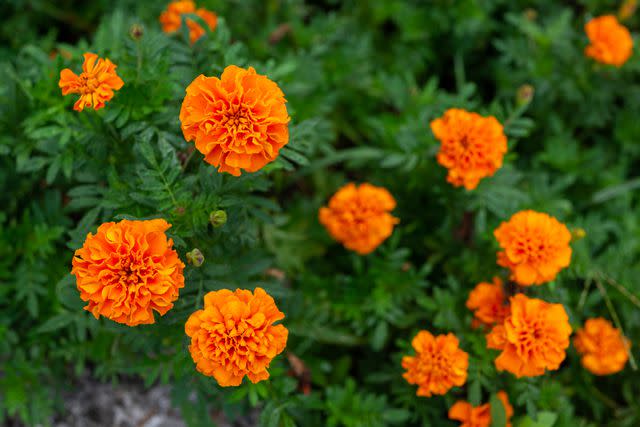
Getty Images/wulingyun
Botanical Name: Tagetes
Sun Exposure: Full sun
Soil Type: Moist, well-drained
Soil pH: Slightly acidic to neutral
Marigolds are a gardener's favorite because they repel harmful insects like nematodes while attracting beneficial insects like ladybugs. "Marigolds are excellent at repelling pests that can damage sunflowers and other plants in your garden," says Laura Janney, Founder and Owner of The Inspired Garden.
But they aren't all function. These cheerful flowers add an extra burst of color to your garden, creating another layer of blooms below the showy sunflowers.
Tomatoes

Getty Images/Platforma
Botanical Name: Solanum lycopersicum
Sun Exposure: Full sun
Soil Type: Loamy, well-drained
Soil pH: Neutral to acidic
While tomatoes and sunflowers have different thirst levels—tomatoes need more frequent watering—these two classic summer plants actually pair well together in the garden. Because sunflowers tower over the tomato plants, they protect them from summer's harshest rays. That helps reduce the amount of moisture tomatoes lose, which helps you extend the time between watering. Plus, sunflowers will trap stink bugs, which are a known enemy of your tomato harvest.
Zucchini
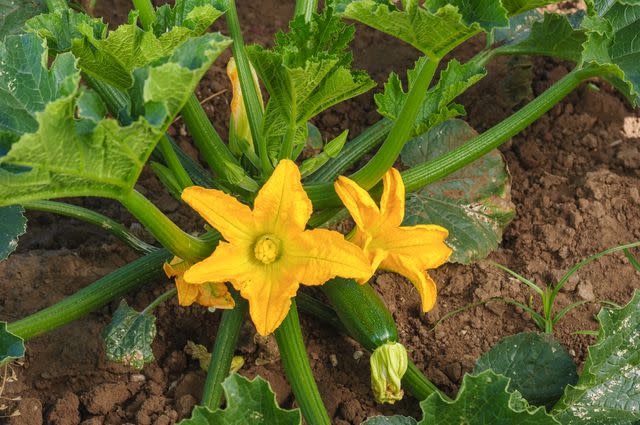
Getty Images/GomezDavid
Botanical Name: Cucurbita pepo
Sun Exposure: Full sun
Soil Type: Fertile, well-drained
Soil pH: Slightly acidic
Zucchini are a beginner-friendly squash that often leaves gardeners with an abundance of fruit. However, when grown with sunflowers, zucchini will use the sunflower's strong, tall stalks as a support. Rather than the vines overtaking your garden, they'll grow stem-in-stem with your summer flowers.
Peppers
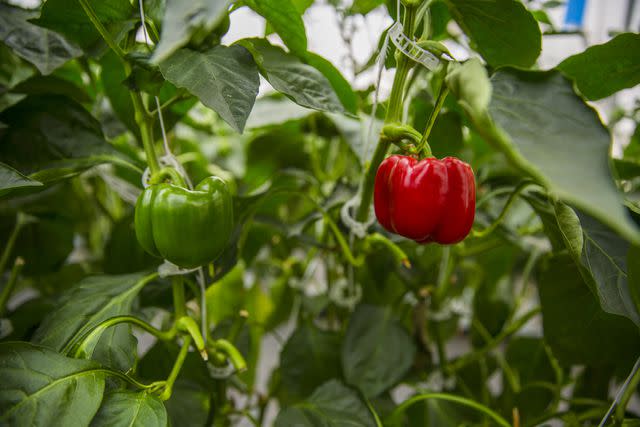
Getty Images/Westend61
Botanical Name: Capsicum annuum
Sun Exposure: Full sun
Soil Type: Fertile, loamy
Soil pH: Neutral
Both sunflowers and peppers enjoy full sun and soil that is not overly wet, making them the perfect companion plants to grow together. Peppers deter pests that might try to attack sunflowers, including aphids, spider mites, and even squirrels. Think of them as the vibrant line of defense you can plant around your sunflowers.
Zinnias
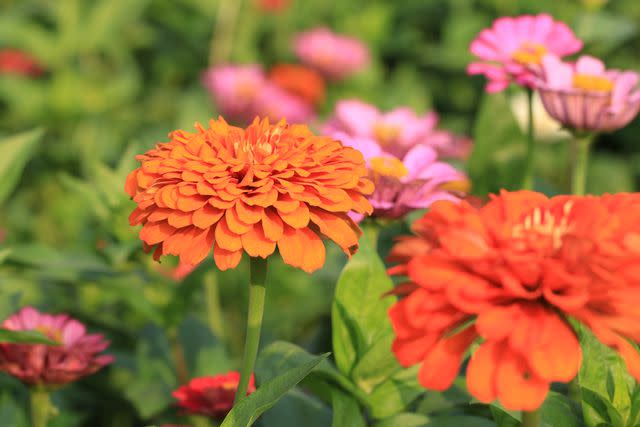
Getty Images/happykamill
Botanical Name: Zinnia elegans
Sun Exposure: Full sun
Soil Type: Well-draining
Soil pH: Neutral
You can echo sunflowers' cheery blooms with smaller, but just as vibrant, zinnias. With their lush blooms that bloom all summer long and sun and soil requirements that match up with sunflowers, these make an ideal lower layer to your flower garden.
Basil
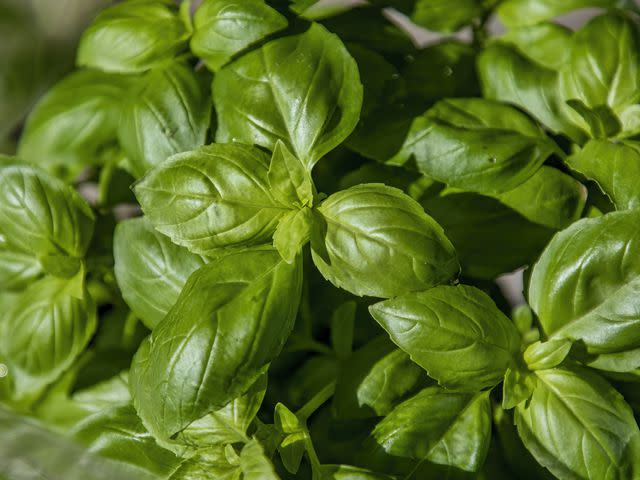
Getty Images/Ali Majdfar
Botanical Name: Ocimum basilicum
Sun Exposure: Full sun to partial shade
Soil Type: Fertile
Soil pH: Acidic to alkaline
While people may love basil's herbal fragrance, it's not a favorite of pests like whiteflies, beetles, and mosquitos. These pesky insects will steer clear when basil is present, while bees and pollinators will flock to the area. That's why it's a beneficial plant to have around when you're growing sunflowers.
Corn
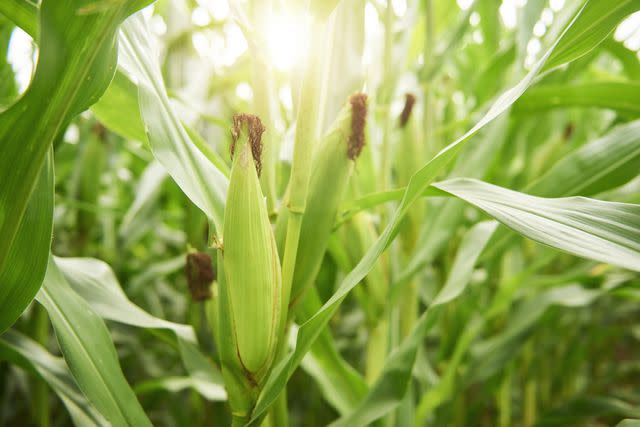
Getty Images/Westend61
Botanical Name: Zea mays
Sun Exposure: Full sun
Soil Type: Loamy, well-drained
Soil pH: Acidic to neutral
Think of corn and sunflowers as summer's favorite brother and sister plants. These two tall plants will grow side-by-side, each reaching for the sun. However, they won't compete for space, soil, or sun, since each grows straight up into the sky.
Chives
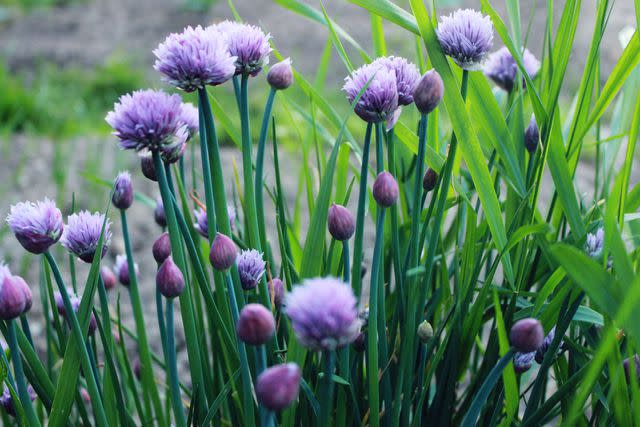
Getty Images/Jasenka Arbanas
Botanical Name: Allium schoenoprasum
Sun Exposure: Full sun to partial sun
Soil Type: Well-drained, loamy, sandy
Soil pH: Slightly acidic to neutral
Chives are easy-to-grow with shallow root systems that won't disturb other plants around them. They will, however, disturb pests, which are turned away from this allium's strong odor. Japanese beetles, aphids, and mites will steer clear when chives are present, meaning they'll also stay away from sunflowers planted nearby. Pollinators, on the other hand, will continue to visit, drawn in by chives' lavender blooms and sunflowers' cheerful yellow flowers.
Shasta Daisy
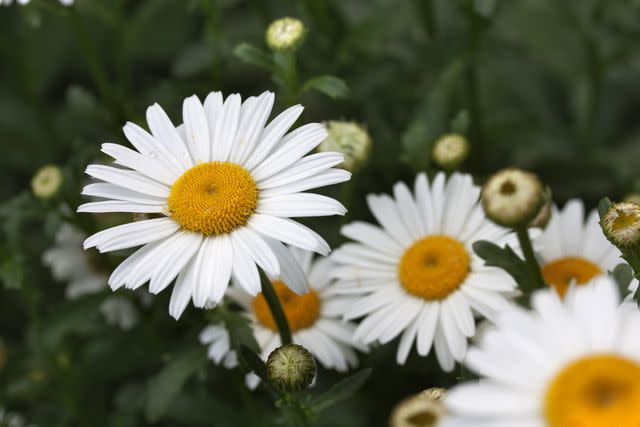
Botanical Name: Leucanthemum × superbum
Sun Exposure: Full sun to partial sun
Soil Type: Well-drained, moist, loamy
Soil pH: Neutral
Shasta daisies make a striking companion plant for sunflowers primarily based on their looks. Sunflowers and daisies have a similar joyful appearance that's perfect for the sunny days of summer. When you plant shorter daisies beneath tall sunflowers, you get a sea of classic summer blooms. Plus, the daisies benefit from the shade provided by the sunflowers.
Lettuce
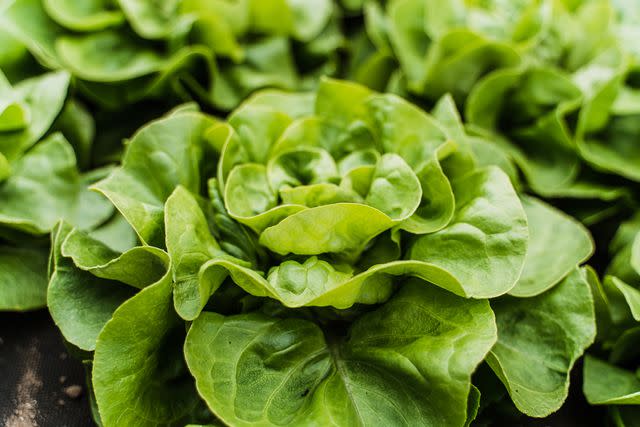
Getty Images/Anna Mardo
Botanical Name: Lactuca sativa
Sun Exposure: Full sun to partial shade
Soil Type: Well-drained, loamy, rich
Soil pH: Acidic to neutral
If you cover the ground beneath sunflowers with lettuce, you'll end up with two companion plants that mutually appreciate what the other brings to the garden. For lettuce, the shade offered by sunflowers is a welcome respite during summer's hottest days. Meanwhile, sunflowers are glad that lettuce attracts ladybugs, which eat aphids and other pesky pests.
Companion Plants To Avoid With Sunflowers
"Sunflowers release allelopathic chemicals that can inhibit the growth of nearby plants, such as potatoes and beans," explains Janney. She also recommends avoiding plants with shallow root systems, since they will compete for nutrients and water, and plants that will be stunted by the shade of tall-reaching sunflowers.
Janney continues, "Pair sunflowers with plants that thrive in similar soil and sun conditions. For instance, while tomatoes prefer moist soil, sunflowers favor drier conditions. Since sunflowers require full sun, avoid planting shade-loving plants like hostas or ferns."
Here are a few of the companion plants to avoid with sunflowers.
Pole Beans
While the idea of using a sunflower as a support for a pole bean sounds genius, it likely won't work in your own garden. Because of the sunflower releasing allelopathic chemicals into the soil, the pole bean's growth will be stunted.
Hostas
Shade-loving hostas thrive in forest-like environments, which is the opposite of what sunflowers prefer.
Potatoes
Potatoes and sunflowers don't get along because of the chemicals that sunflowers release. A potato's growth will be stunted by the sunflower, and, while you may still have a gorgeous sunflower crop, your potato harvest will be lacking.
Related: 40 Sunflower Quotes To Inspire And Brighten Your Day
For more Southern Living news, make sure to sign up for our newsletter!
Read the original article on Southern Living.

